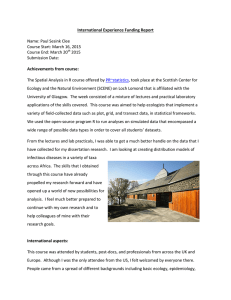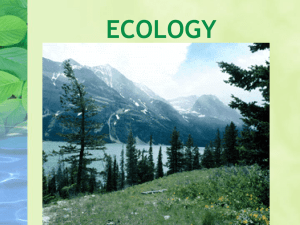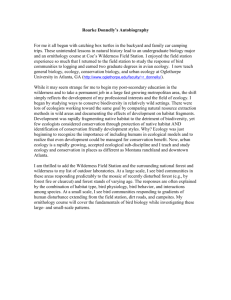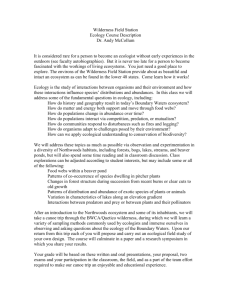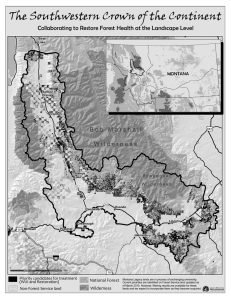Changing Paradigms in Wilderness Ecology: A View of Academia from Outside
advertisement
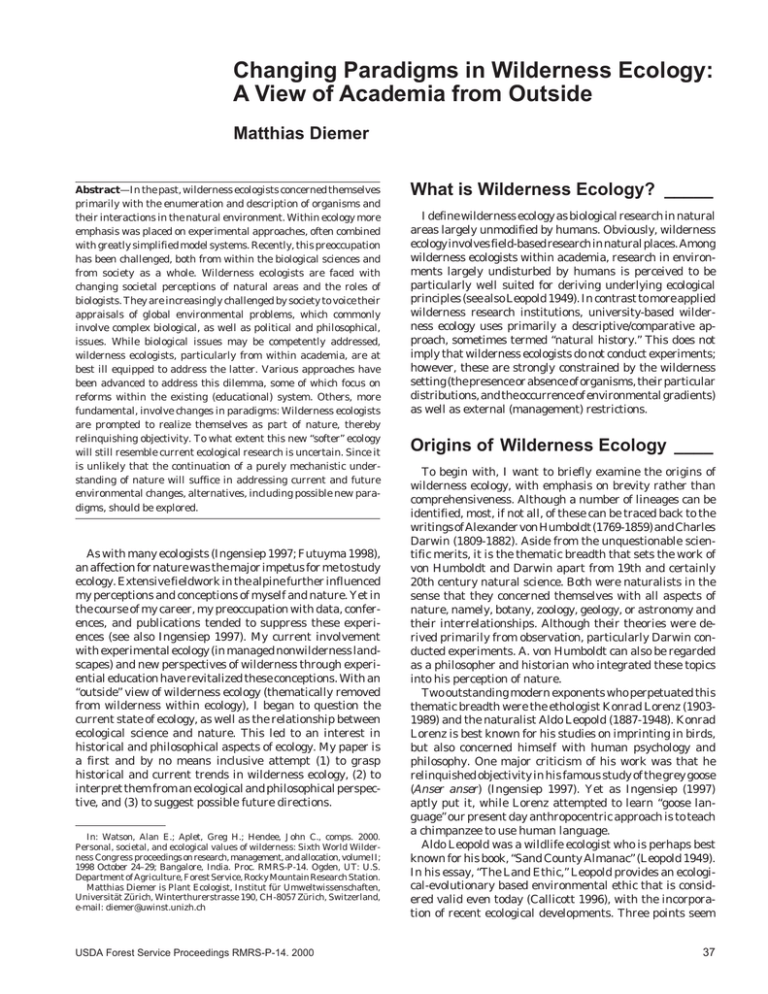
Changing Paradigms in Wilderness Ecology: A View of Academia from Outside Matthias Diemer Abstract—In the past, wilderness ecologists concerned themselves primarily with the enumeration and description of organisms and their interactions in the natural environment. Within ecology more emphasis was placed on experimental approaches, often combined with greatly simplified model systems. Recently, this preoccupation has been challenged, both from within the biological sciences and from society as a whole. Wilderness ecologists are faced with changing societal perceptions of natural areas and the roles of biologists. They are increasingly challenged by society to voice their appraisals of global environmental problems, which commonly involve complex biological, as well as political and philosophical, issues. While biological issues may be competently addressed, wilderness ecologists, particularly from within academia, are at best ill equipped to address the latter. Various approaches have been advanced to address this dilemma, some of which focus on reforms within the existing (educational) system. Others, more fundamental, involve changes in paradigms: Wilderness ecologists are prompted to realize themselves as part of nature, thereby relinquishing objectivity. To what extent this new “softer” ecology will still resemble current ecological research is uncertain. Since it is unlikely that the continuation of a purely mechanistic understanding of nature will suffice in addressing current and future environmental changes, alternatives, including possible new paradigms, should be explored. As with many ecologists (Ingensiep 1997; Futuyma 1998), an affection for nature was the major impetus for me to study ecology. Extensive fieldwork in the alpine further influenced my perceptions and conceptions of myself and nature. Yet in the course of my career, my preoccupation with data, conferences, and publications tended to suppress these experiences (see also Ingensiep 1997). My current involvement with experimental ecology (in managed nonwilderness landscapes) and new perspectives of wilderness through experiential education have revitalized these conceptions. With an “outside” view of wilderness ecology (thematically removed from wilderness within ecology), I began to question the current state of ecology, as well as the relationship between ecological science and nature. This led to an interest in historical and philosophical aspects of ecology. My paper is a first and by no means inclusive attempt (1) to grasp historical and current trends in wilderness ecology, (2) to interpret them from an ecological and philosophical perspective, and (3) to suggest possible future directions. In: Watson, Alan E.; Aplet, Greg H.; Hendee, John C., comps. 2000. Personal, societal, and ecological values of wilderness: Sixth World Wilderness Congress proceedings on research, management, and allocation, volume II; 1998 October 24–29; Bangalore, India. Proc. RMRS-P-14. Ogden, UT: U.S. Department of Agriculture, Forest Service, Rocky Mountain Research Station. Matthias Diemer is Plant Ecologist, Institut für Umweltwissenschaften, Universität Zürich, Winterthurerstrasse 190, CH-8057 Zürich, Switzerland, e-mail: diemer@uwinst.unizh.ch USDA Forest Service Proceedings RMRS-P-14. 2000 What is Wilderness Ecology? _____ I define wilderness ecology as biological research in natural areas largely unmodified by humans. Obviously, wilderness ecology involves field-based research in natural places. Among wilderness ecologists within academia, research in environments largely undisturbed by humans is perceived to be particularly well suited for deriving underlying ecological principles (see also Leopold 1949). In contrast to more applied wilderness research institutions, university-based wilderness ecology uses primarily a descriptive/comparative approach, sometimes termed “natural history.” This does not imply that wilderness ecologists do not conduct experiments; however, these are strongly constrained by the wilderness setting (the presence or absence of organisms, their particular distributions, and the occurrence of environmental gradients) as well as external (management) restrictions. Origins of Wilderness Ecology ____ To begin with, I want to briefly examine the origins of wilderness ecology, with emphasis on brevity rather than comprehensiveness. Although a number of lineages can be identified, most, if not all, of these can be traced back to the writings of Alexander von Humboldt (1769-1859) and Charles Darwin (1809-1882). Aside from the unquestionable scientific merits, it is the thematic breadth that sets the work of von Humboldt and Darwin apart from 19th and certainly 20th century natural science. Both were naturalists in the sense that they concerned themselves with all aspects of nature, namely, botany, zoology, geology, or astronomy and their interrelationships. Although their theories were derived primarily from observation, particularly Darwin conducted experiments. A. von Humboldt can also be regarded as a philosopher and historian who integrated these topics into his perception of nature. Two outstanding modern exponents who perpetuated this thematic breadth were the ethologist Konrad Lorenz (19031989) and the naturalist Aldo Leopold (1887-1948). Konrad Lorenz is best known for his studies on imprinting in birds, but also concerned himself with human psychology and philosophy. One major criticism of his work was that he relinquished objectivity in his famous study of the grey goose (Anser anser) (Ingensiep 1997). Yet as Ingensiep (1997) aptly put it, while Lorenz attempted to learn “goose language” our present day anthropocentric approach is to teach a chimpanzee to use human language. Aldo Leopold was a wildlife ecologist who is perhaps best known for his book, “Sand County Almanac” (Leopold 1949). In his essay, “The Land Ethic,” Leopold provides an ecological-evolutionary based environmental ethic that is considered valid even today (Callicott 1996), with the incorporation of recent ecological developments. Three points seem 37 particularly important to me with respect to wilderness ecology: (1) Leopold emphasizes our kinship with all organisms, (2) he argues that the evolution of a land ethic is both an intellectual and an emotional process, and (3) he calls for more ecological education, although he stresses that “an understanding of ecology does not necessarily originate in courses bearing ecological labels.” Present Trends in Wilderness Ecology _______________________ Current mainstream ecology seems to differ appreciably from the approaches and perceptions of von Humboldt, Darwin, Lorenz, and Leopold. Thematic breadth and the perception of being a part of nature seem to have given way to reductionism and anthropocentrism. In my present field, biodiversity, Naeem and Li (1997) have published an important paper about using artificial microcosms to experimentally verify that species-rich communities have higher reliability than depauperate communities. Surprisingly, despite its apparent artificialness, this experiment is one of the few pieces of evidence supporting the diversity/stability hypothesis. To my knowledge, this hypothesis has never been tested in natural settings. The approach of Naeem and Li (and its success), as well as similar studies, suggest that in many instances underlying ecological principles can only be tested using highly simplified and controlled conditions, yet efforts to derive general ecological theories from experiments have been for the most part futile (Weiner 1995). This reductionism is not entirely due to experimental constraints. A second motive is related to an economic paradigm that has found wide acceptance in science, namely the valuation of science through numbers and quality of publications (see also Ingensiep 1997). My experience from Europe and the United States indicates that, as in other fields, the “publish or perish” syndrome is alive and well in all fields of ecology. We are made to believe that impact factors and publication lists are objective measures of scientific productivity. Consequently, highly productive scientists are rewarded with grants and promotions. An undesirable side effect of this development is that research is driven by the likelihood of publishable results, rather than curiosity or genuine interest in nature. This (emotional) detachment from the study of objects is in fact desirable, since one of the tenets of science is objectivity; however, science is by no means as objective as it pretends to be. Where do these current developments leave wilderness ecologists? Obviously we are also subject to publication pressures, yet at a disadvantage since our approach (and study objects) does not lend itself to the reductionism pursued in mainstream ecology. Furthermore, the descriptive/ comparative approach inherent in field ecology is looked down upon by the growing majority of ecologists who pursue the experimental/manipulative route. In the pecking order of ecology, field ecologists (termed “naturalists” by Futuyma) occupy the lowest position (Futuyma 1998). However, as early as 1974, Passmore proposed a re-evaluation of this status quo (Valsangiacomo 1998). Support has been provided by the current concern for biodiversity loss and conservation issues (Futuyma 1998; Noss 1997) and by J. Weiner 38 (1995) who maintains that “most of the major advances in ecology have been made by scientists with either an extensive background in field natural history or at least a very large treasure of biological knowledge in their heads.” Nevertheless, wilderness ecologists find themselves in the dilemma of either attempting to join the mainstream ecological bandwagon or carrying on in relative obscurity. A brief exploit into the philosophy of nature: how ecologist-philosophers perceive this dichotomy—In 17th and 18th century Europe, natural science was closely linked with religious beliefs as scientists attempted to discover or document the inherent diversity and order of God’s creation (Valsangiacomo 1998; Wilber 1998). Throughout th the 19 century, these perceptions slowly changed, leading to a paradigm shift that coincided with the acceptance of Darwin’s ideas in the sciences in the 1870’s (Valsangiacomo 1998). Evolution as a mechanism driving speciation and extinction displaced creationism. Concurrently, a divergence occurred between what Valsangiacomo (1998) terms “natural science” and “natural history.” “Natural history” uses a descriptive (observational)/comparative approach, and as inherent in its title involves a historical perspective. “Natural science,” on the other hand, is in a sense historical, hence theoretical, and relies on an experimental/manipulative approach. According to Valsangiacomo (1998) “natural science,” which, aside from mainstream ecology, also encompasses physiology, molecular biology, and genetics, relies primarily on experimental/manipulative methodologies. This approach necessitates reduction or abstraction to reduce the complexity of interactions and interrelationships inherent in nature. In their extreme forms, reductionism leads to laboratory microcosms, whereas abstraction leads to cybernetic representations of communities and the biosphere. Furthermore, abstraction places ecology in the vicinity of “pure sciences,” such as physics, and by association may assume a mechanistic or deterministic functioning of nature. Other authors have termed this natural “science/history” dichotomy “functional” and “evolutionary” biology (Mayr 1991), whereas Begon and others (1990) refer to these approaches as attempts to discover “proximate” (functional) and “ultimate” (evolutionary) causes. Weiner (1995), in his assessment of the state of ecology, acknowledges a “centrifugal force” separating what he terms “theoreticians” from “empiricists.” I will use the terms “wilderness (or field) ecology” and “mainstream ecology” because Valsangiacomo’s usage of “natural history” and “natural science” carries the connotation that natural history is “unscientific.” Some mainstream ecologists (and philosophers) may however agree with this connotation. As we have seen, wilderness ecology stands somewhat isolated from mainstream ecology. This isolation is due to historical developments, but also to current trends prevalent in academia. However, wilderness ecology is not merely an academic discipline, rather it also figures prominently in societal concerns for the environment. Societal Demands on Wilderness Ecologists _____________________ The two most relevant challenges for wilderness ecology arise from (1) human-caused global environmental changes and (2) issues pertaining to wilderness use and management. USDA Forest Service Proceedings RMRS-P-14. 2000 The Ecological Crisis It is generally agreed that human-induced environmental changes are not merely a concern for the future; they are presently occurring. Aside from atmospheric changes (climate change, CO2 rise), which are global, the oceans and land area have been impacted by human activities to a great extent. Vitousek and others (1997) estimate that up to 50 percent of the Earth’s land surface has been transformed by human action. Media attention to global environmental changes and associated losses in biodiversity has raised public awareness of the biological sciences. Concurrently, there is a growing public belief, fostered by scientists, that science (including ecology) may provide solutions for mitigating environmental impacts if underlying effects are known. Widely diverging estimates of future rises in sea level, ranging from scenarios of widespread coastal flooding (associated with extensive melting of polar ice sheets) to current estimates of little or no change despite global temperature increases of 2 to 3 oC, have provoked scepticism over the validity of such prognoses by scientists and many nonscientists. The failure of science to resolve such fundamental questions, combined with the spectacular failure of other high-profile prognoses (for example, the proposed largescale forest dieback of Europe and the potential effects of warming or elevated CO2 on plant communities) casts real doubt on the ability of purely technocratic approaches to address the abatement and reduction of environmental impacts. These approaches are likely to fail because (1) underlying principles are poorly understood and (2) current research paradigms are unsuitable (for example, “scaling,” and reliance on models). Attempts to extrapolate from results of experimental plot studies to natural communities seem at best highly unrealistic, but many ecologists studying the effects of elevated CO2 in the 1980’s, including myself (Körner and Diemer 1994), committed this fallacy—and others may do so in the future. Furthermore, it is unlikely that the stereotypic cry for further data (and funding) will lead to a comprehensive understanding of immediate and long-term effects of human impacts on the Earth. This is due to the inherent complexity of organisms and their interrelationships among themselves and their environment. I do not imply, as some deep ecologists might, that current climatechange research should be stopped, but I am concerned by the inherent optimism suggesting that once the underlying mechanistic principles of an ecosystem are known, we will be able to manipulate (reconstitute or cure) it. The roles and contributions of wilderness ecologists (from academia) that are most commonly associated with global environmental changes concern biodiversity and conservation biology. In fact, “natural history” may see somewhat of a resurgence, since skills in identifying organisms are in demand, particularly within the currently booming field of biodiversity research and perhaps in rare plant conservation (see also Noss 1997). An additional, hitherto undervalued, skill is a genuine grasp of not only the organisms, but their environment, phylogeny, diversity, and “idiosyncracies” (Futuyma 1998). A number of naturalists are also directly involved in global change research. Some of them may feel a certain disillusion, as I did, because infrastructure and experimental USDA Forest Service Proceedings RMRS-P-14. 2000 constraints demand more attention than the object of study, or because they perceive the model systems employed to be too simplistic or reduced. Others may feel uncomfortable with “delivering the goods” in the form of short-term results, greatly simplified model parameters, or extrapolations. While many wilderness ecologists are successfully involved in global change research, others are ill equipped, incapable, or unwilling to provide the remedies to ecosystem health expected by society. A part of the problem is the fact that all “remedies” involve complex political and ethical decisions. Questions such as “How much biodiversity is desirable?” actually lie outside the realm of natural science because as G. E. Moore has pointed out (Birnbacher 1991), morals or ethical decisions cannot be derived from nature (the so-called naturalistic fallacy). Thus, ethically, a eutrophicated lake with two algal species is no better or worse than an intact lowland rain forest. I do not mean to imply that wilderness ecologists should not concern themselves with these issues. But we must be aware of inherent value judgments masked by “scientific objectivity.” A second exploit into the philosophy of nature: how th th objective is natural science?—In the 18 and 19 centuries, humans were perceived as parts of nature and, along with inanimate objects, members of the “great chain of being” (Valsangiacomo 1998). As we saw above, this belief in a higher order was displaced by an evolutionary paradigm during the latter part of the 19th century, giving rise to an experimental/manipulative approach. Inherent in this new approach was an emotional detachment from the former study subjects to objects of study. Objectivity and empirical evidence became the most fundamental assumptions of science. Although the methodologies employed by naturalists and natural scientists alike may be objective, the motives leading to scientific questions (and research projects) certainly are not. Hence, according to Meyer-Abich (1997), natural science certainly is not as objective as it pretends to be. This criticism undermines the credibility of science, since scientists are not the detached observers that they pretend to be. Consequently, Meyer-Abich postulates an inevitable paradigm change within natural science, which in some ways related to the 19th century notion that perceived humans (including scientists) as integral parts of nature. Although the logic may differ, this paradigm change has also been suggested by Leopold (1949) in his “kinship with nature” argument, as well as by various post-modernist movements, including deep ecology and ecofeminism. Wilber (1998) severely criticizes these “new paradigms,” because by attempting to infuse science with holism or spirituality one commits a category error. Since empiricism (and reductionism) is fundamental to science, the proposed paradigm change in effect eradicates science. According to Wilber (1998), it is not the scientific method that “constitutes the disaster of modernity,” but the fact “that all higher modes of knowing have been brutally collapsed into nomological and empirical science.” He suggests that natural science should expand from narrow “sensory” empiricism to a broader form, incorporating all forms of experience (including morals and spirituality). Yet it is unclear to me how his “deep science” with a unifying approach to matter, morals, and spirituality can be practically realized. Furthermore, I am doubtful how (and when) it will address the current problems of wilderness and mainstream ecology. So as we can see, although philosophers acknowledge that all is not well with natural science, Meyer-Abich and Wilber diverge fundamentally about the causes and the necessary remedies. 39 Utility of Wilderness The second major challenge for wilderness ecologists concerns wilderness. It is widely known that wilderness and seminatural areas serve a number of consumptive and nonconsumptive human uses. Aside from the use of resources (timber and game) they are important for esthetics, recreation, and education. Leopold (1949) also advocates a utility of wilderness for science, serving as a norm to judge ecosystem health. Wilderness also has an important role in shaping human behavior. This assumption forms the basis of experiential education, which originated from K. Hahn (Heckmair and Michl 1998; see also contributions by J. Hendee, K. Russell and others, this proceedings). Gaard (1997), a leading ecofeminist, reaches a similar conclusion: ... if a wilderness orientation alters human perceptions of nature and culture, it may also alter human conceptions of appropriate ways of structuring the relationship between culture and nature, and through these conceptions, it may alter behaviors as well. Hence, wilderness is important in shaping human identity. In a sense, the relationship between humans and wilderness needs to be redefined: Do we protect wilderness from humans or do we permit interactions between humans and wilderness? (Today it seems obvious that we need not protect humans from wilderness.) Should these interactions be restricted spatially or temporally, or rather, as Gaard (1997) suggests, should wilderness areas be expanded to suit human needs? As mentioned above, these decisions are political, and as Gaard (1997) points out, ethical as well. Wilderness ecologists, both from academia and particularly from more applied research institutions (governmental agencies and non-governmental organizations), play an important role in evaluating acceptable limits to wilderness use, presently and in the future. Yet, the definition of limits of acceptable change (LAC) and ethical decisions concerning the preservation of endangered species are important premises that lie outside the realm of “natural science,” but rather with society or social science. It is the role of wilderness ecology to inform, monitor, and manage societal requirements of wilderness. Wilderness ecologists may perceive this new redefined role as a “subjugation” to society, social science, and ethics; and similar to colleagues within global environmental change research, they may well become disillusioned about their work. Hence it is time to look ahead for possible remedies. “Muddling Through” or in Search of “New Paradigms” _______________ Before we can attempt to examine possible solutions to the present dilemma, let’s first recapitulate the problems: There is a general tendency within mainstream ecology toward reductionism with an emphasis on frequent and rapid dissemination of results (publication pressure), which involve the extrapolation of results of greatly simplified and controlled experiments to higher orders of complexity and diversity. These trends run counter to the natural history approach pursued by most wilderness ecologists, which 40 involves a comprehensive view of organisms, their evolutionary history, and environmental setting. These difficulties become even more severe in the light of human-caused environmental changes, which demand remedies that are often beyond the scope of ecology. Similar problems arise with respect to the appropriate use of wilderness. As we saw, purely scientific answers are insufficient for solving ethical questions. So, let’s examine three possible responses: 1. Muddling through—This response is in effect no response, rather it is the attempt to carry on and to hope that somehow the situation will get better. In fact, there is evidence that at least the status of natural history within natural science may improve. Recently, the evolutionary ecologist D. Futuyma (1998) examined preconceptions of naturalists in the United States, as well as the important contributions of naturalists to modern evolutionary theory. Like Noss (1997), he emphasized the need for increased emphasis on natural history in university education and a broadened perspective comprising both descriptive and reductionist approaches. He concludes: “In fact, perhaps the ‘ologist’ (that is, natural historian) best has the opportunity or the need to integrate the biological sciences” (Futuyma 1998). Weiner (1995) proposes that increased communication between natural history and ecology is not sufficient, rather he advocates a fusion of the two, meaning “... individual ecologists should attempt to be both theoreticians and empiricists.” How this fusion will come about and to what extent the fundamental differences between experimental/manipulative (mainstream ecology) and descriptive/comparative approaches (natural history) can be resolved is unclear. Futuyma’s and Weiner’s ideas have initiated a discussion among ecologists, which is also one of my primary objectives here. However, while these discussions within ecology may facilitate contacts and reduce tensions, they will not alleviate what I perceive to be fundamental problems. A final exploit into the philosophy of nature: how can natural science change?—As we saw above, philosophers of nature widely disagree about the causes and remedies of what they perceive to be the crisis of natural science. One central argument is that the detachment of humans from nature is the cause of many human-induced environmental problems. Natural science, with its dogma of objectivity, indirectly contributes to this exploitation of nature (Meyer-Abich 1997). How can we be expected to preserve nature if we lack concern and compassion? Nearly 50 years ago Aldo Leopold (1949) wrote: “It is a century now since Darwin gave us the first glimpse of the origin of species. We know now…that men are only fellowvoyagers with other creatures in the odyssey of evolution. This new knowledge should have given us…a sense of kinship with fellow-creatures; a wish to live and let live; a sense of wonder over the magnitude and duration of the biotic enterprise.” But how do we attain this kinship? I will attempt to classify the suggestions according to whether they can be realized within the existing system or whether they require a new approach to natural science (new paradigm). USDA Forest Service Proceedings RMRS-P-14. 2000 2. Reformation from within—In agreement with Leopold (1949), Ingensiep (1997) mandates a reformed natural science, which perceives humans (and scientists) as an integral part of nature. To facilitate this view, he has made the following three practical suggestions: (1) intensification of contacts between scientists and nonscientists, (2) interdisciplinary sabbaticals, and (3) interdisciplinary science education, which includes the history of natural science and ethics. Some of the problems that wilderness ecologists are facing stem from historical developments, such as the split between natural history and natural science (Valsangiacomo 1998). Furthermore, wilderness ecologists are increasingly confronted with ethical questions and are ill prepared to address them. These difficulties could be alleviated through the institutional changes proposed by Ingensiep (1997). In fact, at least in Europe, there have been real efforts to foster interdisciplinarity in environmental science research and, as Ingensiep (1997) has pointed out, these contacts can serve as a forum for wilderness and mainstream ecologists (as well as for physiologists, geneticists, and biochemists) to become exposed to social, ethical, and philosophical concepts. Yet it is doubtful that institutional changes will influence personal convictions. My view (albeit external) of the interpersonal dealings within one of the interdisciplinary projects mentioned above certainly serves as no basis for optimism. However, there is no a-priori requirement that we have to extend the questionable “objectivity/criterion” of science into our perceptions of culture and nature. For example, Allendorf (1997) advocates the incorporation of the Buddhist concept of mindfulness into conservation biology. In effect, various religious and esoteric practices aimed at overcoming the human/nature dichotomy may be equally suitable for attaining this conviction. 3. New paradigms—As Wilber (1998) pointed out, many of the postmodernist “new paradigm” movements (including deep ecology and ecofeminism in their extreme forms) are, in essence, nihilistic and anti-scientific (see also Weiner 1995). Their objective is not a scientific revolution (that is, paradigm change as defined by Kuhn [1962]), but rather the abolition of natural science. The most plausible new paradigm is Meyer-Abich’s (1997) notion of “Mit-Wissenschaft,” which implies a natural science instilled by the personal convictions about our kinship with nature. It is difficult to predict which topics this new ecology (“softer” by current standards) in the line of von Humboldt, Darwin, Leopold, and Lorenz will pursue, and which methodologies it will utilize. I suspect one major difference will be the motivation: Rather than primarily by funding or by publication potential, it will be driven by genuine concern and curiosity for nature. Realization of this paradigm will certainly not be easy; however, because it is based on personal beliefs, it has the potential to become somewhat of a grass-roots revolution. Postscript Although I attempted to use the term “paradigm” in the sense of Kuhn (1962), I certainly failed by the rigorous definitions of Wilber (1998). And although I agree that it is USDA Forest Service Proceedings RMRS-P-14. 2000 a buzz-word or even “at present a dead metaphor” (Wilber 1998), I can think of no suitable alternative (which once established would likely suffer a similar fate). Acknowledgments ______________ H. -P. Cito Hufenus and A. Habiba Kreszmeier introduced me to a new experiential perception of wilderness and encouraged me to examine ecology and spirituality. Christina Ausderau introduced me to environmental ethics and served as a vital “reality check” in the overwhelming and novel world of philosophical concepts and reasoning. She, Markus Fischer, with his background in ecology and physics, and Greg Aplet, with yet another perspective on wilderness, thoroughly reviewed this manuscript. References _____________________ Allendorf, F. W. 1997. The conservation biologist as Zen student. Conservation Biology. 11: 1045-1046. Begon, M.; Harper, J. L.; Townsend, C. R. 1990. Ecology. 2nd ed. Oxford: Blackwell Science Ltd. 945 p. Birnbacher, D. 1991. Natur als Massstab menschlichen Handelns. (Nature as a measure of human action.) Zeitschrift für philosophische Forschung. 45: 60-76. Callicott, J. B. 1996. Do deconstructive ecology and sociobiology undermine Leopold’s land ethic? Environmental Ethics. 18: 353372. Futuyma, D. J. 1998. Wherefore and whither the naturalist? American Naturalist. 151: 1-6. Gaard, G. 1997. Ecofeminism and wilderness. Environmental Ethics. 19: 5-24. Heckmair, B., Michl, W. 1998. Erleben und Lernen—Einstieg in die Erlebnispädagogik. (Experience and learning - an introduction to experiential education.) 3rd ed. Berlin: Luchterhand. 282 p. Ingensiep, H. W. 1997. Auf der Suche nach einer anderen Biologie. (In search of a different biology.) In: Meyer-Abich, K. M., ed. Vom Baum der Erkenntnis zum Baum des Lebens. (From the tree of knowledge to the tree of life.) München: Beck’sche Verlagsbuchhandlung: 293-336. Körner, Ch.; Diemer, M. 1994. Evidence that plants from high elevation retain their greater photosynthetic efficiency under elevated CO2. Functional Ecology. 8: 58-68. Kuhn, T. S. 1962. The structure of scientific revolutions. Chicago: University of Chicago Press. 172 p. Leopold, A. 1949. Sand County almanac. New York: Oxford University Press. 226 p. Mayr, E. 1991. Eine neue Philosophie der Biologie. (Towards a new philosophy of biology.) München: Piper. 470 p. Meyer-Abich, K. M. 1997. Mit-Wissenschaft: Erkenntnisideal einer Wissenschaft für die Zukunft. (Participative science—cognitive ideal of a science for the future.) In: Meyer-Abich, K. M., ed. Vom Baum der Erkenntnis zum Baum des Lebens. (From the tree of knowledge to the tree of life.) München: Beck’sche Verlagsbuchhandlung: 19-161. Naeem, S.; Li, S. B. 1997. Biodiversity enhances ecosystem reliability. Nature. 390: 507-509. Noss, R. F. 1997. The failure of universities to produce conservation biologists. Conservation Biology. 11: 1267-1269. Valsangiacomo, A. 1998. Die Natur der Ökologie. (The nature of ecology.) Zürich: vdf. 324 p. Vitousek, P. M.; Mooney, H. A.; Lubchenko, J.; Melillo, J. M. 1997. Human domination of Earth’s ecosystems. Science. 277: 494-499. Weiner, J. 1995. On the practice of ecology. Journal of Ecology. 83: 153-158. Wilber, K. 1998. The marriage of sense and soul. New York: Random House. 225 p. 41


